Ирвин Ялом - The Schopenhauer Cure
Здесь есть возможность читать онлайн «Ирвин Ялом - The Schopenhauer Cure» весь текст электронной книги совершенно бесплатно (целиком полную версию без сокращений). В некоторых случаях можно слушать аудио, скачать через торрент в формате fb2 и присутствует краткое содержание. Жанр: Психология, на русском языке. Описание произведения, (предисловие) а так же отзывы посетителей доступны на портале библиотеки ЛибКат.
- Название:The Schopenhauer Cure
- Автор:
- Жанр:
- Год:неизвестен
- ISBN:нет данных
- Рейтинг книги:5 / 5. Голосов: 1
-
Избранное:Добавить в избранное
- Отзывы:
-
Ваша оценка:
- 100
- 1
- 2
- 3
- 4
- 5
The Schopenhauer Cure: краткое содержание, описание и аннотация
Предлагаем к чтению аннотацию, описание, краткое содержание или предисловие (зависит от того, что написал сам автор книги «The Schopenhauer Cure»). Если вы не нашли необходимую информацию о книге — напишите в комментариях, мы постараемся отыскать её.
The Schopenhauer Cure — читать онлайн бесплатно полную книгу (весь текст) целиком
Ниже представлен текст книги, разбитый по страницам. Система сохранения места последней прочитанной страницы, позволяет с удобством читать онлайн бесплатно книгу «The Schopenhauer Cure», без необходимости каждый раз заново искать на чём Вы остановились. Поставьте закладку, и сможете в любой момент перейти на страницу, на которой закончили чтение.
Интервал:
Закладка:
orchestrated to validate the effectiveness of drugs and briefer therapies; from the media,
which never tired of ridiculing therapists; from behaviorists; from motivational speakers;
from the hordes of new age healers and cults all competing for the hearts and minds of
the troubled. And, of course, there were doubts from within: the extraordinary molecular
neurobiological discoveries reported with ever–increasing frequency caused even the
most experienced therapists to wonder about the relevance of their work.
Julius was not immune to these attacks and often entertained doubts about the
effectiveness of his therapy and just as often soothed and reassured himself.Of course he
was an effective healer.Of course he offered something valuable to most, perhaps even
all, of his patients.
Yet the imp of doubt continued to made its presence known:Were you really, truly,
helpful to your patients? Maybe you`ve just learned to pick patients who were going to
improve on their own anyway.
No. Wrong! Wasn`t I the one who always took on great challenges?
Huh, you`ve got your limits! When was the last time you really stretched yourself—
took a flagrant borderline into therapy? Or a seriously impaired schizophrenic or a
bipolar patient?
Continuing to thumb through old charts, Julius was surprised to see how much
posttherapy information he had—from occasional follow–up or «tune–up» visits, from
chance encounters with the patient, or from messages delivered by new patients they had
referred to him. But, still, had he made an enduring difference to them? Maybe his results
were evanescent. Maybe many of his successful patients had relapsed and shielded that
information from him out of sheer charity.
He noted his failures, too—folks, he had always told himself, who were not ready
for his advanced brand of deliverance. Wait, he told himself, give yourself a break,
Julius. How do you know they werereally failures?permanent failures? You never saw
them again. We all know there are plenty of late bloomers out there.
His eye fell upon Philip Slate`s thick chart. You want failure? he said to
himself.There was failure. Old–time major–league failure. Philip Slate. More than twenty
years had passed, but his image of Philip Slate was crisp. His light brown hair combed
straight back, his thin graceful nose, those high cheekbones that suggested nobility, and
those crisp green eyes that reminded him of Caribbean waters. He remembered how
much he disliked everything about his sessions with Philip. Except for one thing: the
pleasure of looking at that face.
Philip Slate was so alienated from himself that he never thought to look within,
preferring to skate on the surface of life and devote all his vital energy to fornication.
Thanks to his pretty face, he had no end of volunteers. Julius shook his head as he rifled
through Philip`s chart—three years of sessions, all that relating and support and caring,
all those interpretations without a whisper of progress. Amazing! Perhaps he wasn`t the
therapist he thought he was.
Whoa, don`t jump to conclusions, he told himself. Why would Philip continue for
three years if he had gotten nothing? Why would he continue to spend all that money for
nothing? And God knows Philip hated to spend money. Maybe those sessions had
changed Philip. Maybe hewas a late bloomer—one of those patients who needed time to
digest the nourishment given by the therapist, one of those who stored up some of the
therapist`s good stuff, took it home, like a bone, to gnaw on later, in private. Julius had
known patients so competitive that they hid their improvement just because they didn`t
want to give the therapist the satisfaction (and the power) of having helped them.
Now that Philip Slate entered his mind, Julius could not get him out. He had
burrowed in and taken root. Just like the melanoma. His failure with Philip became a
symbol embodyingall his failures in therapy. There was something peculiar about the
case of Philip Slate. From where had it drawn all that power? Julius opened his chart and
read his first note written twenty–five years before.
PHILIP SLATE—Dec. 11, 1980
26 yr old single white male chemist working for DuPont—develops new pesticides—
strikingly handsome, carelessly dressed but has a regal air, formal, sits stiffly with little
movement, no expression of feelings, serious, absence of any humor, not a smile or grin,
strictly business, no social skills whatsoever. Referred by his internist, Dr. Wood.
CHIEF COMPLAINT: «I am driven against my will by sexual impulses.»
Why now? «Last straw» episode a week ago which he described as though by rote.
I arrived by plane in Chicago for a professional meeting, got off the plane, and
charged to the nearest phone and went down my list of women in Chicago looking for
a sexual liaison that evening. No luck! They were all busy. Of course they were busy:
it was a Friday evening. I knew I was coming to Chicago; I could have phoned them
days, even weeks earlier. Then, after calling the last number in my book, I hung up
the phone and said to myself, «Thank God, now I can read and get a good night`s
sleep, which is what I really wanted to do all along.»
Patient says that phrase, that paradox—«which is what I really wanted to do
all along»—haunted him all week and is the specific impetus for seeking therapy.
«That`s what I want to focus on in therapy,” he says. «Ifthatis what I want—to read
and to get a good night`s sleep—Dr. Hertzfeld, tell me—why can`t I, why don`t I, do
it?»
Slowly more details of his work with Philip Slate coasted into mind. Philip had
intellectually intrigued him. At the time of their first meeting he had been working on a
paper on psychotherapy and the will, and Philip`s question—why can`t I do what I truly
want to do?—was a fascinating beginning for the article. And, most of all, he recalled
Philip`s extraordinary immutability: after three years he seemed entirely untouched and
unchanged—and as sexually driven as ever.
Whatever became of Philip Slate? Not one word from him since he abruptly bailed
out of therapy twenty–two years ago. Again Julius wondered whether, without knowing
it, he had been helpful to Philip. Suddenly, he had to know; it seemed a matter of life and
death. He reached for the phone and dialed 411.
2
_________________________
Ecstasy in the act of
copulation. That is it! That
is the true essence and core
of all things, the goal and
purpose of all existence.
_________________________
«Hello, is this Philip Slate?»
«Yes, Philip Slate, here.»
«Dr. Hertzfeld here. Julius Hertzfeld.»
«Julius Hertzfeld?»
«A voice from your past.»
«The deep past. The Pleistocene past. Julius Hertzfeld. I can`t believe it—it must
be what?...at least twenty years. And why this call?»
«Well, Philip, I`m calling about your bill. I don`t believe you paid in full for our
last session.»
«What? The last session? But I`m sure...”
«Just kidding, Philip. Sorry, some things never change—the old man is still jaunty
and irrepressible. I`ll be serious. Here, in a nutshell, is why I`m calling. I`m having some
health problems, and I`m contemplating retirement. In the course of making this decision
I`ve developed an irresistible urge to meet with some of my ex–patients—just to do some
follow–ups, to satisfy my own curiosity. I`ll explain more later if you wish. Soooo—
Читать дальшеИнтервал:
Закладка:
Похожие книги на «The Schopenhauer Cure»
Представляем Вашему вниманию похожие книги на «The Schopenhauer Cure» списком для выбора. Мы отобрали схожую по названию и смыслу литературу в надежде предоставить читателям больше вариантов отыскать новые, интересные, ещё непрочитанные произведения.
Обсуждение, отзывы о книге «The Schopenhauer Cure» и просто собственные мнения читателей. Оставьте ваши комментарии, напишите, что Вы думаете о произведении, его смысле или главных героях. Укажите что конкретно понравилось, а что нет, и почему Вы так считаете.
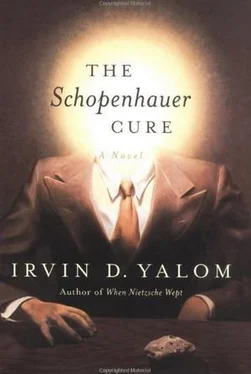


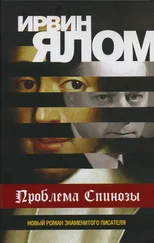
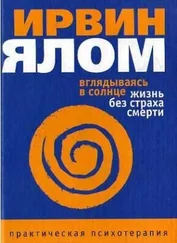
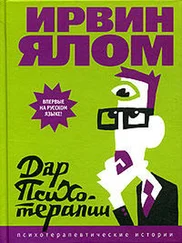
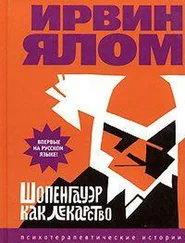

![Ирвин Ялом - Проблема Спинозы [litres]](/books/396345/irvin-yalom-problema-spinozy-litres-thumb.webp)

